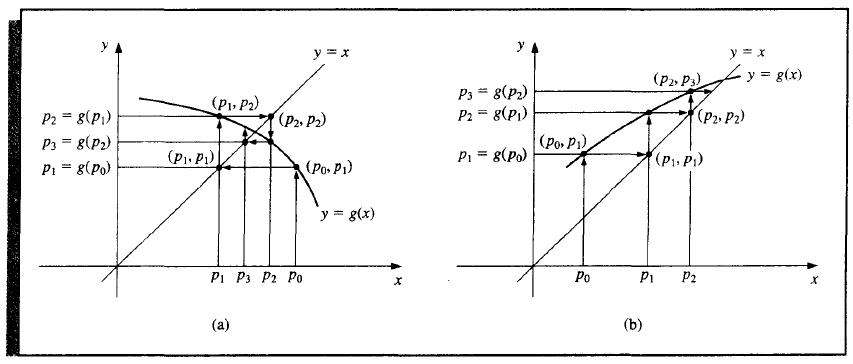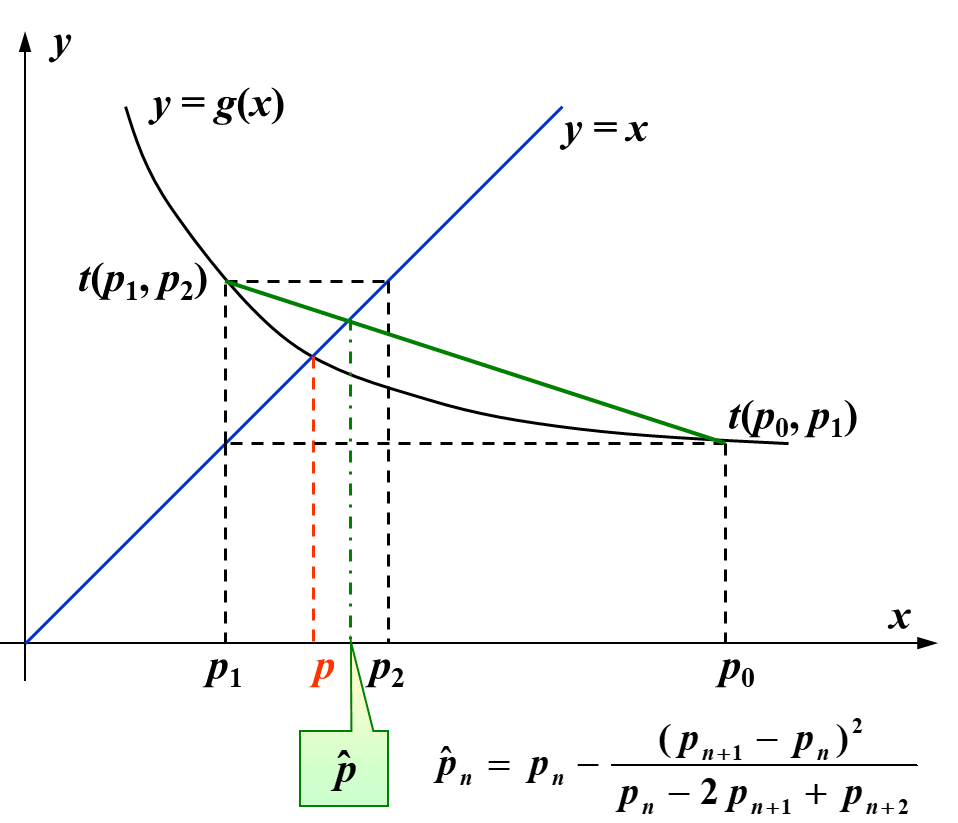Chapter 2 | Solution of Equations in One Variable¶
Bisection Method¶
Theorem 2.0
Suppose that \(f \in C[a, b]\) and \(f(a)\cdot f(b) \lt 0\). The Bisection method generates a sequence \(\{p_n\}\) \((n = 0, 1, 2,\dots)\) approximating a zero \(p\) of \(f\) with
Key Points for Algorithm Implementation¶
- \(mid = a + (b - a)\ /\ 2, \text{but not } mid = (a + b)\ /\ 2\), for accuracy and not exceeding the limit of range.
- \(sign(FA)\cdot sign(FM)\gt 0, \text{but not }FA\cdot FM \gt 0\), for saving time.
Pros & Cons¶
Pros
- Simple premise, only requires a continuous \(f\).
- Always converges to a solution.
Cons
- Slow to converge, and a good intermediate approximation can be inadvertently discarded.
- Cannot find multiple roots and complex roots.
Fixed-Point Iteration¶
Theorem12.1 | Fixed-Point Theorem
Let \(g \in C[a,b]\) be such that \(g(x) \in [a,b], \forall x \in [a, b]\). Suppose \(g'\) exists on \((a,b)\) and that a constant \(k\) \((0\lt k \lt 1)\) exists, s.t.
Then \(\forall\ p_0 \in[a,b]\), the sequence \(\{p_n\}\) defined by
converges to the unique fixed-point \(p\in [a,b]\).
.
Corollary 2.2
\(\Rightarrow\) The smaller \(k\) is, the faster it converges.
Newton's Method (Newton-Raphson Method)¶
Newton's method is an improvement of common fixed-point iteration method above.
Theorem 2.3
Let \(f\in C^2[a,b]\) and \(\exists\ p\in[a,b]\), s.t. \(f(p) = 0\) and \(f'(p) \ne 0\), then \(\exists\ \delta \gt 0\), \(\forall\ p_0 \in [p - \epsilon, p + \epsilon]\), s.t. the sequence \(\{p_n\}_{n = 1}^\infty\) defined by
converges to \(p\).
Error Analysis for Iterative Methods¶
Definition 2.0
Suppose \(\{p_n\}\) is a sequence that converges to \(p\), and \(\forall n\), \(p_n \ne p\). If positive constants \(\alpha\) and \(\lambda\) exist with
then \(\{p_n\}\) conveges to \(p\) of order \(\alpha\), with asymptotic error constant \(\lambda\).
Specially,
- If \(\alpha = 1\), the sequence is called linearly convergent.
- If \(\alpha = 2\), the sequence is called quadratically convergent.
Theorem 2.4
The common fixed-point iteration method (\(g'(p) \ne 0\)) with the premise in Fixed-Point Theorem is linearly convergent.
Proof
Theorem 2.5
The Newton's method \((g'(p)=0)\) is at least quadratically convergent.
Proof
More commonly,
Theorem 2.6
Let \(p\) be a fixed point of \(g(x)\). If there exists some constant \(\alpha \ge 2\) such that \(g\in C^\alpha [p-\delta, p+\delta]\), \(g'(p)=\dots=g^{(\alpha-1)}(p)=0\), \(g^{(\alpha)}(p)=0\). Then the iterations with \(p_n = g(p_{n-1})\), \(n \ge 1\), is of order \(\alpha\).
Multiple Roots Situation¶
Notice that from the proof above, Newton's method is quadratically convergent if \(f'(p_n) \ne 0\). If \(f'(p) = 0\), then the equation has multiple roots at \(p\).
If \(f(x) = (x - p)^mq(x)\) and \(q(p)\ne 0\), for Newton's Method,
It is still convegent, but not quadratically.
A way to speed it up
Let
then \(\mu (x)\) has the same root as \(f(x)\) but no multiple roots anymore. And
Newton's method can be used there again.
Pros & Cons¶
Pros
- Quadratic convegence
Cons
- Requires additional calculation of \(f''(x)\)
- The denominator consists of the difference of the two numbers both close to \(0\).
Accelerating Convergence¶
Aitken's \(\Delta^2\) Method¶
Definition 2.1
Forward Difference \(\Delta p_n = p_{n+1} - p_n\). Similarly \(\Delta^kp_n = \Delta(\Delta^{k-1}p_n)\)
Representing Aitken's \(\Delta^2\) Method by forward difference, we have
Theorem 2.7
Suppose that \(\{p_n\}\) is a sequence, \(\lim\limits_{n\rightarrow \infty}p_n = p\), \(\exists N\), s.t. \(\forall\ n > N\), \((p_n - p)(p_{n+1} -p) \gt 0\). Then the sequence \(\{\hat{p_n}\}\) converges to \(p\) faster than \(\{p_n\}\) in the sense that
The algorithm to implement it is called Steffensen’s Acceleration.
创建日期: 2022.12.21 01:34:02 CST

